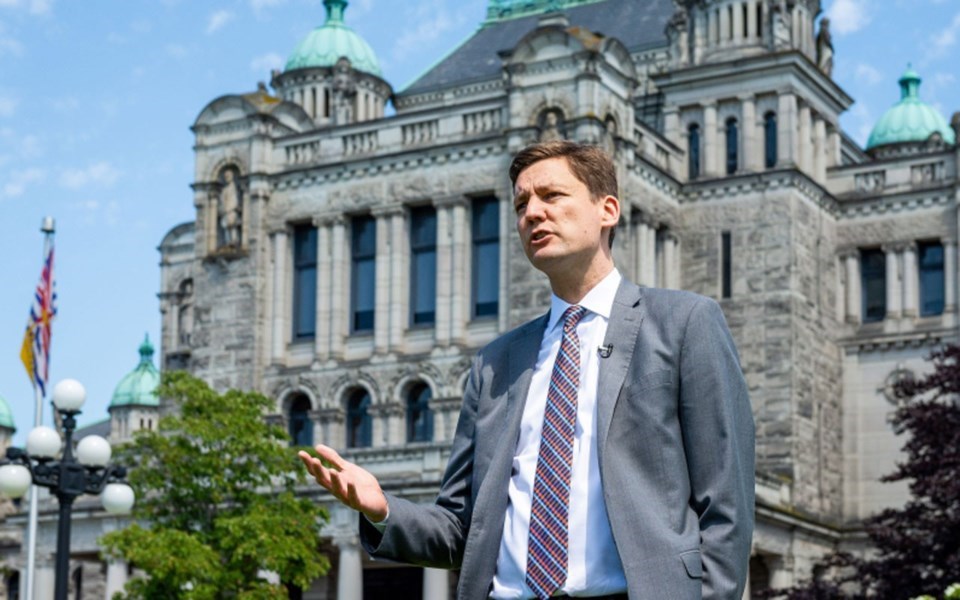The province’s $89.4-billion budget offers a lot of opportunities to local governments like Whistler, but Mayor Jack Crompton said local officials will watch for more announcements in the lead-up to the election later this year.
“Like any budget, there are opportunities within it, and obvious challenges,” Crompton said in an interview with Pique.
As always, housing is top of mind: Crompton said he is enthusiastic about investments in housing projects through the recently-announced BC Builds program, which also benefits from $2 billion in federal funding and is intended to provide housing for middle-income Canadians.
The Resort Municipality of Whistler (RMOW) was listed as one of the 20 municipalities in B.C. already identified through the program as a partner in BC Builds.
“I was really excited about being one of the announced partners of BC Builds, which indicates to me that some of those housing investments will find themselves in Whistler,” said Crompton.
With that in mind, Crompton said the RMOW is still digesting the budget and its various opportunities, and added officials will keep an ear to the ground on “contingency announcements”—meaning announcements in the lead-up to the provincial election in October.
The budget has more than $10 billion in funds set aside for contingency expenses over the next three years, explained in a budget backgrounder as being for “emergent costs, future priorities and caseload pressures.”
“There’s still lots to learn about this budget through some of the contingency announcements that will happen in the lead-up to the election,” Crompton said. “Our goal will be to continue to advocate hard for some of those investments finding themselves in Whistler.”
As reported over the last few months, the NDP government has made sweeping changes on the housing file, including forcing heightened densities across the province, and cracking down on short-term rentals.
Crompton previously welcomed the boost in density, noting the changes would require the province to step up funding for municipalities to support it. He repeated that sentiment again, post-budget, on the basis that increased density will increase demand on utilities.
“The changes they are making on housing policy are enormous, and whatever uptake is realized will really dictate whether we have the resources to support [it] … local governments over the next year or two or five are going to be spending a lot of time and resources quantifying the impact of these changes and making the case for the required provincial investment to support it,” he said. “I think it’s too early to say whether they are resourcing it in a way that will facilitate the kind of growth that they want to see.”
That said, Crompton added the RMOW is encouraged by the province’s willingness to fund projects in the last few years.
“We were able to secure $10 million in fuel-treatment funding; we’ve been able to secure significant investments into affordable housing; we’ve been successful in drawing funding for water infrastructure,” he said. “If that kind of investment continues and grows, I think we could find ourselves in a good place.”
Another file Crompton said officials are hopeful to take advantage of involves general property transfer tax exemptions for purpose-built rental housing constructed between January 2025 and December 2030.
“We currently have to pay property transfer tax when we move property between our own subsidiaries,” he said. The RMOW has partnerships and subsidiary organizations in the Whistler Housing Authority and Whistler 2020 Development Corp.
“If it applies, this could apply meaningful savings to Cheakamus Lot 5 and any rental projects delivered by the private sector, which is good news,” Crompton said. “We’ll be asking lots of questions as to exactly how we can maximize those savings for residents—those savings would show up in lower rental rates.”
And of course, the RMOW is keeping an eye on transit: Both locally within Whistler and on a regional scale.
While there are no line items within the budget on regional transit, Crompton said the RMOW is holding out for the election-season goodies.
“I think that touches back to paying attention to announcements of contingency spending,” he said. “We’re hopeful about transit funding, as really it’s our No. 1 way to meet our 2030 goals to reduce carbon emissions.”
For its part, the RMOW has approved pursuing a 7,650-hour service expansion locally in regards to transit—but because transit requires both municipal and provincial funding, and the province makes the decisions, it is on the province to step up.
“The municipality is willing to put up our portion if we can draw the provincial investment,” Crompton said. “We’re expecting decisions on which transit-service expansions will receive approval in the upcoming weeks, and we’re hopeful our proposal will succeed.”
It’s the same story for regional transit.
“Regional transit is not listed in the budget, so unless it does come as a contingency announcement, we will continue the advocacy work on that file,” the mayor said.




